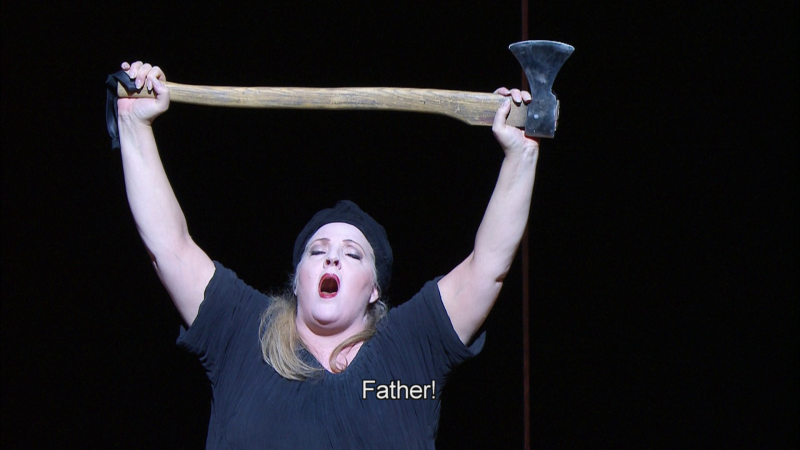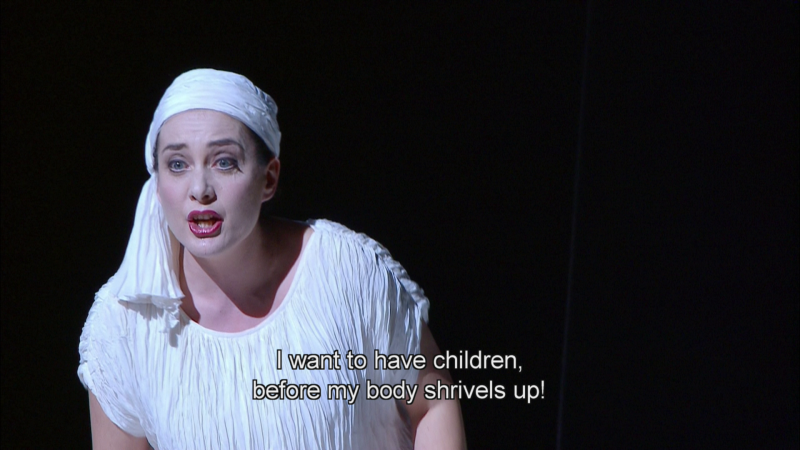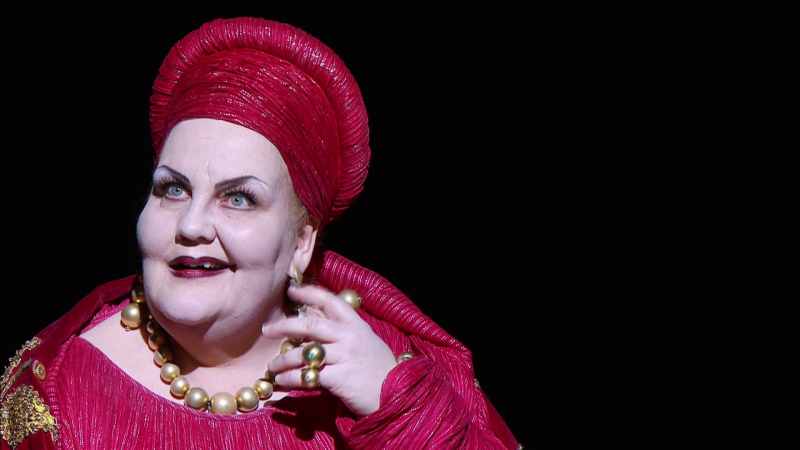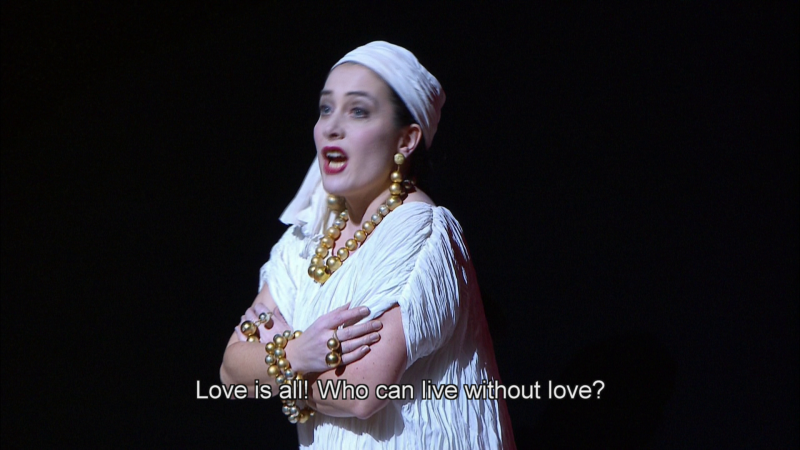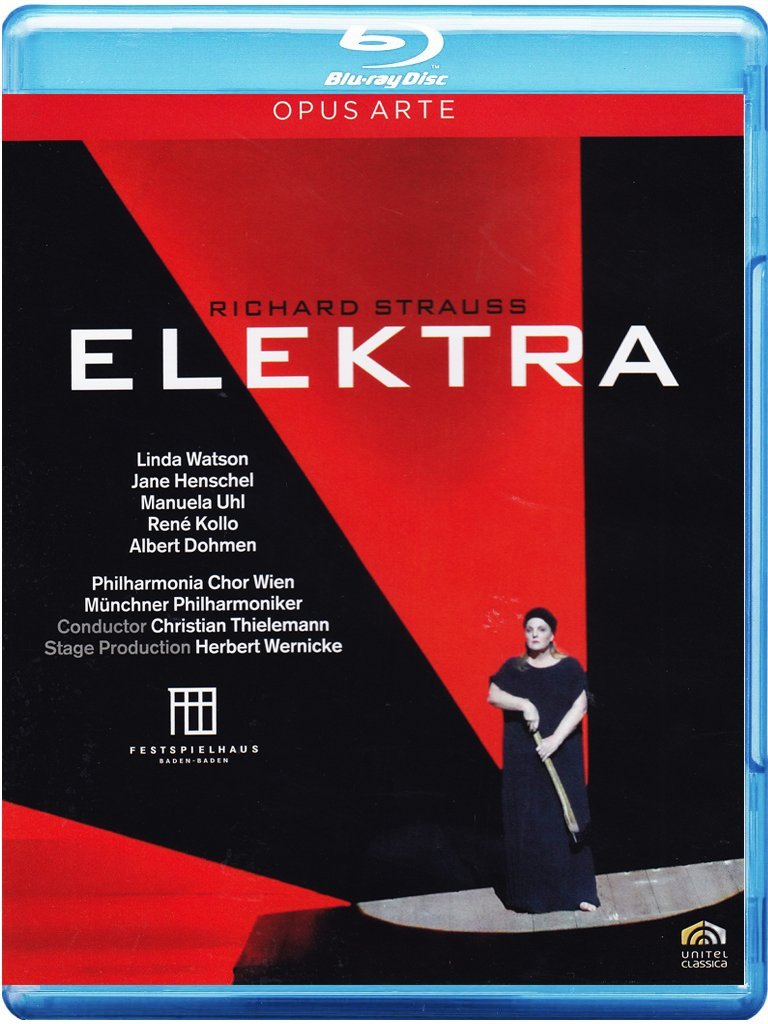
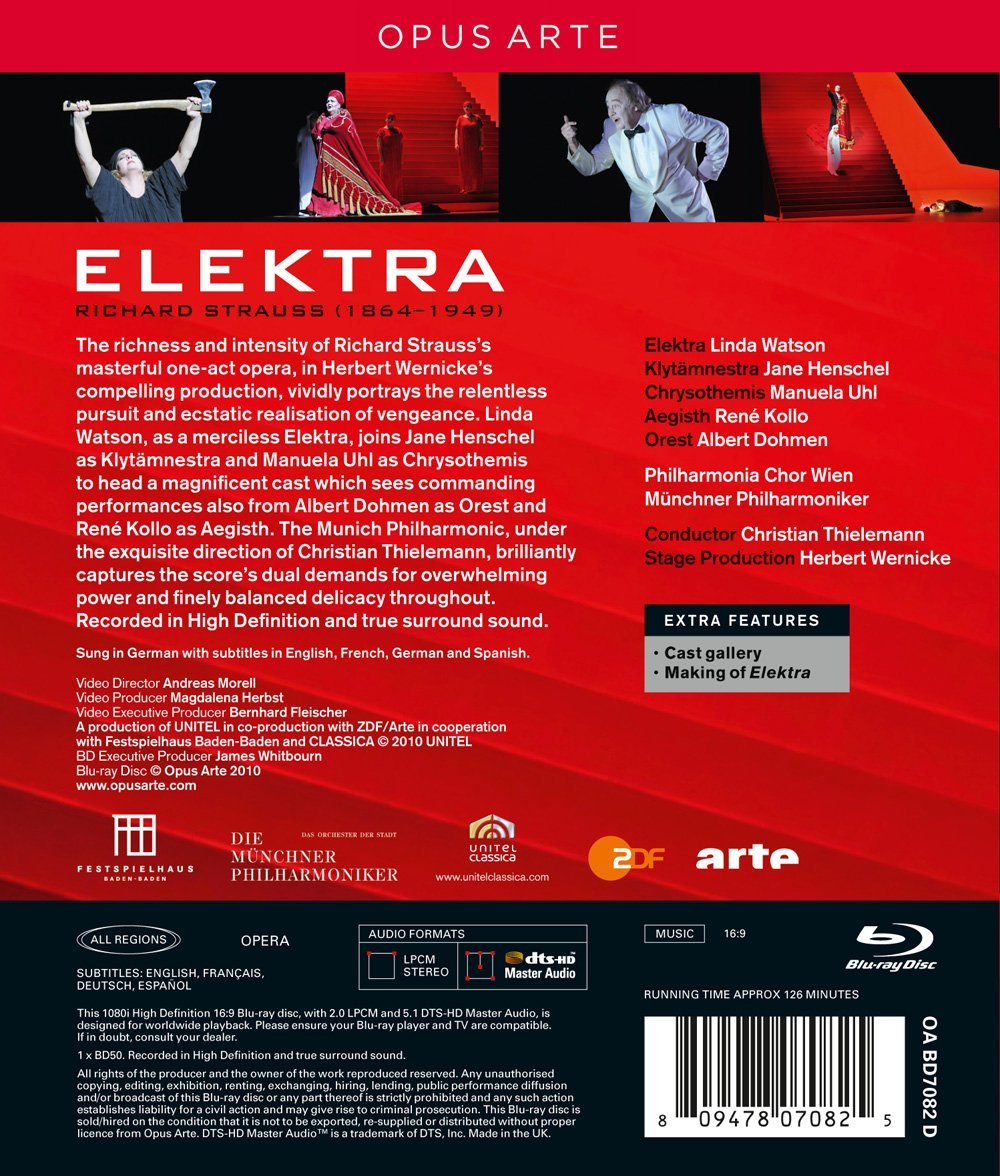
Richard Strauss Elektra opera to a libretto by Hugo von Hofmannsthal. Original stage production by Herbert Wernicke (died 2002) as restaged 2010 by Bettina Göschl at the Festspielhaus Baden-Baden. Stars Linda Watson (Elektra), Jane Henschel (Klytämnestra), Manuela Uhl (Chrysothemis), René Kollo (Aegisth), Albert Dohmen (Orest), Andreas Hörl (Orest's Tutor), Jörg Schneider (Young Servant), Carsten Sabrowski (Old Servent), Irmgard Vilsmaier (Overseer), Constance Heller, Nina Amon, Hermine Haselböck, Katrin Adel, Bernarda Bobro (Maidservants), Iwona Sakowicz (Trainbearer), and Catherine Veillerobe (Confidante). Christian Thielemann conducts the Münchner Philharmoniker with the Philharmonia Chor Wien (Chorus Master Walter Zeh). Stage adaptation by Frank Kuhlmann and Christoph Lettow; costumes by Dorothee Melzer; lighting by Felix Kirchhofer and Christian Kass. Directed for TV by Andreas Morell. Sung in German. Released 2010, has 5.1 dts-HD Master Audio sound. Grade: A+
This starkly minimalist Wernicke/Göschl production has three props and two set elements. The props are an ax, a flashlight, and a royal cloak. One set element is a staircase. The other set element is a huge black panel installed close the the front of the stage. This panel normally blocks most of the view of the rear of the stage. But when the panel is turned on its diagonal, the audience finally see what's behind. When the back of the stage is most fully revealed, it's illuminated in an intense flood of bright-blood red. What you see on the front of the stage is mostly in black and white.
By cutting even into the bone, the director keeps us focused on the Elektra's rage, Klytämnestra's guilt, and the plight of Chrysothemis (who just wants to be a wife and mom). Further, the singing is directed in a semi-concert style. The singers move about in appropriate costumes, but when singing they mostly face the audience so the audience can see and hear them as well as possible. The result is that the singers get to focus more than might otherwise be the case on acting and clear diction. The cast must have been cautioned not to overact, because the facial expressions are appropriate for high-definition TV recording. The Hugo von Hofmannsthal libretto is one of the best in opera; it's grand that you can clearly understand almost all of the German, especially as rendered by Linda Watson and Jane Henschel.
The sound engineers were ordered to let us hear all the singing as well as the magnificent undergirding of the orchestra, directed with loving care by Thielemann. And the video is extremely sharp and well-planned with a pleasing mix of full stage shots as well as wonderful closeups. The result of all this is a production in HDVD that can hardly be criticized and that you can watch repeatedly with admiration.
Linda Watson (Elektra) is heroinic in life and death. In the libretto, Elektra dies from exhaustion while doing a victory dance. This production skips the dance. Elektra kills herself because, I think, she is now free to join Agamemnon. Manuela Uhl is warmly fetching as Chrysothemis. You desperately want her to find relief and this makes the conclusion of the show remarkably satisfying with it's "happy" ending.
But the greatest star of this production is Jane Henschel as Klytämnestra. She gives us the most terrifying depiction of a female yet presented in HDVD. (First runner up might be Diana Damrau as Queen of the Night in the Magic Flute.) Although saturated in blood-lust, Klytämnestra is afloat in self-pity and utterly pathetic in seeking help from her daughter, whom she then threatens with torture when help is denied. Henschel makes it all completely believable with her talent for combining music and text with insightful acting. Guys, see that svelte bride of 19 coming down the aisle? Well, Henschel shows you what three children and 30 years of rooting at banquet tables can do to a women!
This production deserves to be in everyone's HDVD library. Watch and you may feel some of that purging of the soul that is supposed to be the purpose of tragedy. (Alas, Roger Pines writing in the February 2011 International Record Review completely misses his flight as he reviews the DVD version and is apparently not aware that the title in available in HDVD. Richard Fairman does better in the February 2011 issue of Gramophone in praising how the sets "come across with striking clarity in this high-quality film," but you can't tell if he was watching the DVD or the Blu-ray version!)
Now for some screenshots. Although the subtitles here are in English, I'm sticking with the German spelling of names as used in the keepcase booklet.
After the murder of Agamemnon, daughter Elektra (Linda Watson) became a wretched outcast living behind her mother's palace. The servant girls gossip about her:
Elektra rages against Klytämnestra (Jane Henschel) and Aegisth (René Kollo) for murdering Agamemnon. She's waiting, of course, for her brother Orest to return and revenge Agamemnon's death. As a result of her obsession, she is supposed to be unkempt and nearly starved to death. (Linda Watson is not exactly emaciated, but I guess it's hard to find skinny girls who can sing Elektra. (In the libretto, the ax, which is the same one used to kill Agamemnon, has been buried by Elektra to be unearthed on judgment day):
Chrysothemis (Manuela Uhl) is loyal to her father's memory also. But Chrysothemis mostly just wants to get out of the palace and be a wife. Uhl makes her a vulnerable and appealing character who arouses tremendous sympathy:
Klytämnestra can't sleep. Accompanied by her trainbearer (Iwona Sakowicz) and confidante (Catherine Veillerobe), Klytämnestra wants to consult Electra about a remedy:
How would you like to be interrogated by this woman?:
Klytämnestra thinks Elektra knows what sacrifice will dispel bad dreams and let one sleep. She threatens her daughter:
Elektra agrees there is a sacrifice that will let her mother sleep. The sacrifice is Klytämnestra's own neck:
But suddenly, Klytämnestra hears that Orest is dead:
The rumor that Orest is dead is disinformation spread by Orest. He aims to increase the element of surprise when he attacks:
Now Elektra recognizes her brother:
Orest and his forces enter the palace while Aegisth is gone. There are still loyal servants in the house hoping for his return. Fighting breaks out. Klytämnestra is killed immediately and Aegisth is killed later when he comes home. There's a big celebration as Orest take charge:
Chrysothemis puts on the royal jewelry:
Elektra does a victory dance which ends when she kills herself with the ax:
Chrysothemis watches Elektra's death in horror:
Orest and Chrysothemis contemplate the future:
Here is a trailer in HD.
OR

